With an announcement by Prime Minister Justin Trudeau Wednesday morning, Canada has joined the United States, United Kingdom, and Australia in staging a diplomatic boycott of the 2022 Winter Olympics in Beijing, China.
It isn’t the first time boycotts have been organized over the games: Cold War tensions lead to the 1980 games held in the Soviet Union to be boycotted, which was followed by a retaliatory boycott by the Soviets and allied countries of 1984’s games hosted in Los Angeles. In 1976, Canada itself was faced with a boycott as dozens of African nations refused to participate, due to a complex matter involving a New Zealand national rugby tour of Apartheid South Africa.
What makes the 2022 Beijing Olympic boycott different is that the diplomatic boycott will still allow athletes who’ve trained their lives for the games the chance to participate, but Canada won’t be sending any diplomats or politicians to China for the games.
According to Dr. Angela Schneider, the director for the International Center for Olympic studies at Western University, the shift from a full boycott to a diplomatic boycott is a step forward for athletes: “It’s actually progress to go from a full boycott to a diplomatic boycott because at least the athletes have the right to decide if they’re going or not. The last full boycott that Canada participated in at 1980, the athletes were not given a choice or given a voice on it.”
When it comes to making that decision, Dr. Schneider clarifies that risks of political retaliation against Canadian athletes travelling to Beijing are unlikely. “With the Olympic Games, China has invited our athletes to come, so we have an invitation, and they are a host. To then take some kind of aggressive action against their guests, that would be very different and quite extreme. So although I can understand why people express those concerns, I can’t imagine China being a host and inviting athletes to come and then advance some kind of aggression against them or abduct them.”
The worry Dr. Schneider has with the announcement of the boycott is the possibility of overtly politicizing what she says should be a peaceful, cooperative experience. It remains to be seen what the impact of the diplomatic boycott will have on the games, whether more countries will join, and what repercussions will be felt in the games to come. As it stands, the diplomatic boycott of the games is a largely symbolic move, and one Dr. Schneider doesn’t expect will impact athletes and their sports.






Comments